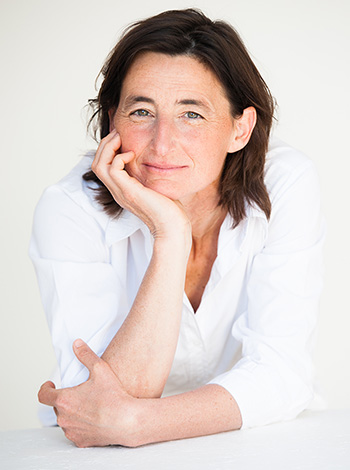2017-2018 Center Fellowship Goes to Utrecht University's Geraldien von Frijtag Drabbe Künzel

 Personal relationships between Jews and non-Jews in Europe before and during World War II will be brought to light during Geraldien von Frijtag Drabbe Künzel’s semester in residence at USC Shoah Foundation Center for Advanced Genocide Research this fall.
Personal relationships between Jews and non-Jews in Europe before and during World War II will be brought to light during Geraldien von Frijtag Drabbe Künzel’s semester in residence at USC Shoah Foundation Center for Advanced Genocide Research this fall.
von Frijtag was awarded the 2017-2018 Center Fellowship at USC Shoah Foundation Center for Advanced Genocide Research. The fellowship is given to an outstanding senior international scholar from any discipline who will advance genocide research through use of the Visual History Archive and other USC resources. The Center Fellow spends up to one semester in residence at USC Shoah Foundation and gives a public talk during his or her stay. Von Frijtag’s residence will begin in August 2017.
An assistant professor in the department of political history at Utrecht University, the Netherlands, von Frijtag writes and lectures on contemporary European history with particular emphasis on the Holocaust, Nazi-occupied Europe, political violence, and conflict and war in 20th century Europe.
Her interest in researching World War II and the Holocaust is inspired in part by her own family history, she said. Her grandfather, a military pilot, was shot down by Germans in 1940, and both sides of her family were impacted by the German occupation of the Netherlands during the war.
von Frijtag’s research during her fellowship at USC Shoah Foundation will similarly focus on the impact of the Holocaust on ordinary people. Through testimony, she aims to uncover how relationships between Jews and their non-Jewish neighbors developed or changed over the course of World War II.
In many Western European cities before the war, Jews were assimilated into non-Jewish society, von Frijtag said, and maintained good relations with their classmates, coworkers and neighbors. Once the war began and antisemitic policies and practices went into effect, these friendships were put to the ultimate test.
Testimonies in the Visual History Archive will help von Frijtag build a “micro-history” of how the Holocaust impacted individuals at the most personal level.
“By really focusing and zooming in on small details of the Holocaust, in particular personal relationships and interactions, it will allow me to take a really grassroots perspective and analyze in much more detail how it happened that people started to move away from each other,” von Frijtag said.
Testimonies in which survivors discuss their relationships with non-Jews and how those relationships changed over the course of the war will be crucial to von Frijtag’s research. She also wants to compare cities that had different Jewish survival rates to see how personal relationships may have helped Jews survive – or not.
“[The extermination of Jews in] Amsterdam was successful, but in other cities only 50 percent instead of 75 percent of Jews were caught and deported,” she said. “There are huge local and regional differences.”
Though she has already watched testimony in the Visual History Archive from home, von Frijtag is looking forward to spending a whole semester focusing only on delving deeply into the archive while in residence at the Center. It can be “difficult and much more emotional” to watch testimonies of survivors than to examine other sources, she said.
von Frijtag also hopes her research can offer something new to the Dutch scholarship on the Holocaust.
“I’m just fascinated by this micro-historical approach,” she said. “It could be such a contribution to the scholarship in general.”
Like this article? Get our e-newsletter.
Be the first to learn about new articles and personal stories like the one you've just read.